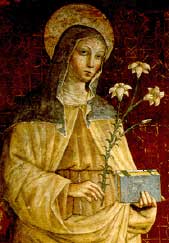Contemplative, Lover of the Holy Eucharist, Miracle Worker, Humble Servant of God!
(Please visit our page on the Poor Clare Nuns)

Saint Clare, follower of the famous St Francis of Assisi, was born to a noble family of the town of Assisi, in Umbria, Italy in the year 1193. When her neighbor Francis gave away all his possessions to follow Jesus in poverty and prayer, Clare felt herself drawn to follow his example. Under his direction, she founded an order of contemplative nuns vowed to poverty, chastity, and obedience who are often known today as the “Poor Clares.”
To many, the poverty Clare and the nuns embraced, was absurd. Some thought the poverty and sacrifices of the nuns was too harsh, too much to be asked. To Clare this was simply not true, nothing was too great a sacrifice to offer her Beloved Lord, and her nuns joyfully followed her in this life. St. Clare and her sisters wore no shoes, ate no meat, lived in a poor house, and kept silent most of the time. Yet they were very happy, because Our Lord was close to them all the time.
They knew in their hearts the truths so often lost in today’s modern world. That, sacrifices done out of love for another are made lighter by a true love. To truly love another requires sacrifices, emotions of love are the reward that comes from giving of one’s self. To these dear nuns there was true peace and often joy in the submission of their will, the complete laying down of their life to God. They wanted to give their all to Him, in loving return for His lovingly giving His very life on the Cross for all.

The next truth they found was that poverty, willingly undertaken, was not a burden, rather, it was freeing to not be weighed down by material concerns, or caring for all manner of possessions. Many of them were of noble birth, they had experienced all this world had to offer, and yet they chose to abandon it all for a higher calling, namely the total giving of their all for Love of God. They found the more they emptied themselves out of their own interests and desires, the more they were filled. They experienced great peace in the simplicity they lived. The nuns trusted in God to provide their needs, through the generosity of others. This has been the way of the Poor Clares for over 800 years now, and He has never let them down, often times providing miraculously.
As they trust in God to provide for them, the Poor Clares work together in organized unity each day. Each has assigned tasks, and fulfills it joyfully, providing through their work for the needs of all in the community; cooking, cleaning, gardening to provide for their grocery needs, doing laundry, caring for the sisters who are sick or elderly, they do it all. In this way they uplift each other and the life of poverty is no more a burden, but an offering to God to gain graces for the salvation of souls, and the needs of those who ask their prayers.
During her lifetime, Clare was renowned for her deep holiness and great wisdom. She gave herself over to prayer and contemplation, leading her charges by her great example of consuming love for the Lord, looking to Him to lead her in all her decisions. Clare led her charges by her example, and joined them in all their tasks, leading with the love and care of a mother.

Clare’s deep union with the Lord and persistent prayers, often were rewarded by miracles. Twice, God saved the convent through the intercession of St. Clare. In September 1240, hoards of Saracen mercenaries attacked the walls of the monastery on their way to the city. Although very sick, St. Clare had herself carried to the wall and right there, where the enemies could see it, she had the Blessed Sacrament placed. Then on her knees, she begged God to save the Sisters, and suddenly for no humanly explainable reason the Saracens retreated. A similar situation occurred when the troops of Vitalis d’Aversa attacked Assisi in June of 1241. Again her deep devotion to the Eucharist brought her before the Blessed Sacrament and again the city was spared. Olive Jars were filled with oil after she blessed them. St. Clare experienced her own “multiplication of the loaves” when on another occasion, she fed 50 sisters and all the Franciscan friars with a single loaf of bread. Once a very heavy door came off its hinges and fell on top of her, but when a number of sisters in a panic rushed to lift it off, instead of finding her crushed, she was not harmed at all and said it felt no heavier than a blanket. The sick were cured when she made the sign of the cross over them. At times when she meditated, the sisters saw a rainbow aura surrounding her.
One Christmas Eve, Clare was too ill to rise from her bed to attend Mass at the new Basilica of St. Francis. Although she was more than a mile away she saw Mass on the wall of her dormitory. So clear was the vision that the next day she could name the friars at the celebration. It was for this last miracle that she has been named patroness of television.
Pilgrims to San Damiano, the first monastery of the Poor Clares in Assisi, are shown a picturesque spot that tradition has christened “the garden of St. Clare.” It is told that St. Clare worked in the garden along with her Sisters. It is not difficult to imagine the Seraphic Mother working there, tending her flowers, praising God, perhaps even humming softly St. Francis’ “Canticle of the Creatures.” The seeds of long ago were pure, natural, old-fashioned heirloom and open-pollinated varieties, none of the hybridized or GMO stuff of today. Seeds were handed down from generation to generation, as are the wonderful heirlooms of this day. We are sure St. Clare would have valued the goodness of heirloom and open-pollinated seeds in their pure form as God created them, since she had much affection for the creations of our good God. And in her thriftiness she would have appreciated the money saved by gathering and replanting one’s own seeds. Most certainly she knew the value of working a garden and growing their own food to provide for the needs of their community of Sisters, and the poor who came to them for help.
There is another garden where St. Clare of Assisi can be found, as well, – the garden of prayer. Here, too, she meets us as an accomplished gardener, a proficient guide who is willing to assist us in cultivating the soil in order to enjoy the flowers and savor the fruits of prayer.
In this modern age of materialism, self-interest, and godlessness, St. Clare stands as example to us of simplicity, love for God, fidelity, and self-sacrifice. We have chosen her as the patron of our business, and hope her life story has inspired you.
“Totally love Him, Who gave Himself totally for your love.”
-St. Clare of Assisi
“Gaze upon Him, consider Him, contemplate Him, as you desire to imitate Him.”
-St. Clare of Assisi
“Our labor here is brief, but the reward is eternal. Do not be disturbed by the clamor of the world which passes like a shadow. Do not let the false delights of a deceptive world deceive you.”
-St. Clare of Assisi

